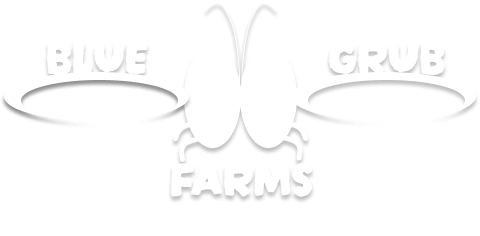Bugs for Breakfast? Why Black Soldier Fly Larvae Might Be Your Next Superfood
Ever found yourself staring into your morning protein shake, wondering if there might be a more sustainable way to get your daily nutrients? Well, hold onto your breakfast spoons, because the humble Black Soldier Fly larvae might just be crawling their way onto your plate—and for good reason! Black Soldier Flies (scientific name Hermetia illucens, if you're feeling fancy) aren't your average household pests. Unlike their annoying housefly cousins that buzz around your banana bread, these remarkable creatures are nature's recycling champions and nutritional powerhouses rolled into one small, wriggly package.
What makes them special? For starters, they're not interested in your picnic or landing on your sandwich. Adult Black Soldier Flies don't even have functioning mouthparts, they live solely to reproduce and then politely exit the stage. It's their larvae that are stealing the spotlight in the world of sustainable nutrition. If you're wrinkling your nose at the thought of eating insect larvae, consider this: Black Soldier Fly larvae (BSFL) pack a nutritional punch that would make most superfoods blush. With up to 50% crude protein by dry weight and up to 35% lipids, these little larvae are protein powerhouses. Their amino acid profile is remarkably similar to fishmeal, making them a potential replacement for one of our most unsustainable protein sources.
But wait, there's more! BSFL contain more zinc and iron than lean meat, nutrients essential for immune function and oxygen transport in our bodies. They're also surprisingly rich in calcium, with levels that can surpass those found in milk. Who knew these tiny creatures could be such nutritional giants? Here's where things get really interesting. While your chicken breast requires vast amounts of land, water, and feed to produce, BSFL are the ultimate upcyclers. They happily feast on organic waste streams, everything from food scraps and agricultural byproducts to less appetizing options like chicken manure and brewery waste.
In Kenya, researchers have found that BSFL can be reared on readily available organic waste streams, turning what would be garbage into nutritious insect protein. These larvae can reduce organic waste biomass by 50-60%, effectively turning your trash into their treasure and potentially, your next protein bar. The environmental footprint? Minuscule compared to traditional livestock. BSFL requires minimal water, no land clearing, and produces significantly fewer greenhouse gases than cattle or pigs. Plus, they don't need antibiotics or growth hormones to thrive. Mother Nature's perfect little protein factories, if you will.
Innovative chefs and food scientists are finding creative ways to incorporate BSFL into familiar foods. Ground into flour, they can become part of pasta, bread, or protein bars. Roasted, they develop a crispy exterior with a soft interior that some compare to roasted nuts. And for the less adventurous, BSFL oil can be extracted and used as a nutritious cooking oil or supplement. If eating insects seems foreign to Western palates, it's worth noting that entomophagy, the practice of eating insects, has been part of human diets around the world for millennia. Over 2 billion people regularly consume insects as part of their traditional diets.
In Thailand, fried insects are popular street food snacks. Mexican cuisine features chapulines (grasshoppers) in various dishes. And across Africa and Asia, numerous cultures have long recognized the nutritional and environmental benefits of insect consumption. While Black Soldier Flies specifically are relatively new to the human food scene, they're quickly gaining attention from food security experts and sustainability advocates alike. The European Food Safety Authority has already approved dried yellow mealworms for human consumption, and BSFL may not be far behind in regulatory approval.
Beyond basic nutrition, researchers are exploring potential health benefits of BSFL. Their unique fatty acid profile, including lauric acid, may offer antimicrobial properties. Some studies suggest that chitin, a compound found in insect exoskeletons, might have beneficial effects on gut health and immune function. While more research is needed before we can call BSFL a "miracle food," their potential extends beyond mere sustenance. As we learn more about the complex relationship between diet and health, these humble larvae might offer benefits we're only beginning to understand.
If you're feeling brave, how might you incorporate BSFL into your diet? Currently, the most accessible option for most consumers is through protein powders and supplements made from dried, processed larvae. These offer nutritional benefits without requiring you to look your dinner in the compound eyes, so to speak. For the more adventurous, specialty food retailers and online stores are beginning to offer dried BSFL for cooking. Start small, perhaps by adding some BSFL powder to your morning smoothie or trying BSFL pasta. Your taste buds (and the planet) might thank you.
Of course, safety comes first. Only consume BSFL that have been specifically raised for human consumption under proper conditions. Like any food, quality and safety standards matter enormously. Will Black Soldier Fly larvae become as common on Western plates as chicken or beef? Perhaps not overnight. But as we collectively reconsider our food systems and their impact on our planet, these efficient, nutritious insects deserve a place in the conversation about sustainable nutrition.
So the next time someone asks "what's for dinner?" Maybe, the answer could be these remarkable little larvae. After all, in a world of increasing food insecurity and environmental challenges, thinking outside the box might be exactly what we need. Who knows? Your grandchildren might wonder why we ever thought eating insects was strange in the first place. In the meantime, if you're looking to reduce your environmental footprint while boosting your nutrition, Black Soldier Fly larvae might just be the food of the future.
References:
Shumo, M., et al. (2019). The nutritive value of black soldier fly larvae reared on common organic waste streams in Kenya. Scientific Reports, 9, Article number: 10110.
SNAS Biotech. (2023). Can Humans Eat Black Soldier Fly Larvae: Examining the Nutritional Benefits.
